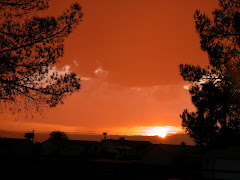performed by SGM Woody English,
U.S. Army Band,
playing on a B flat Bach Stradivarius Field Trumpet (bugle)
Just to make it clear... I'm blogging about the bugle call and not "The Atlantic Paranormal Society" off the tv show Ghost Hunters. ;o)
Of all the military bugle calls, none is so easily recognized or more apt to render emotion than the call Taps. The melody is both eloquent and haunting and the history of its origin is interesting and somewhat clouded in controversy. In the British Army, a similar type call known as Last Post has been sounded over soldiers' graves since 1885, but the use of Taps is unique to the United States military, since the call is sounded at funerals, wreath-laying and memorial services.
An Excerpt From
Twenty-Four Notes That Tap Deep Emotions:
The story of America's most famous bugle call
by Jari Villanueva
Tomorrow Taps will be sounded at numerous Memorial Day ceremonies across the country and it too has its origins from the Civil War. Originally developed as an alternative to the Extinguish Lights (Lights Out) bugle call, General Daniel Butterfield with his bugler Oliver Norton came up with Taps in 1862. The bugle call spread from General Butterfield's command to other units in both the Union and Confederate armies.
So how did Taps come to be associated with funerals? The first known use of the bugle call was during the same campaign in 1862 where Gen. Butterfield developed the call. Captain John C. Tidball commanding an artillery battery ordered it played for the burial of one of his men. Because of his battery's advanced position he was worried that the traditional 3 volleys that was typically fired at the graveside funeral might renew the fighting.
For the full story I encourage everyone to click the link above (with pictures) or this link to a website associated with West Point.
There are no official words set to Taps but over the years many verses have been written to go with the notes. Here are a few of the most popular collected by Mr. Villanueva.
Day is done, gone the sun,
From the hills, from the lake,
From the sky.
All is well, safely rest,
God is nigh.
Go to sleep, peaceful sleep,
May the soldier or sailor,
God keep.
On the land or the deep,
Safe in sleep
Love, good night, Must thou go,
When the day, And the night
Need thee so?
All is well. Speedeth all
To their rest.
Fades the light; And afar
Goeth day, And the stars
Shineth bright,
Fare thee well; Day has gone,
Night is on
Thanks and praise, For our days,
'Neath the sun, Neath the stars,
'Neath the sky,
As we go, This we know,
God is nigh.
Just to make it clear... I'm blogging about the bugle call and not "The Atlantic Paranormal Society" off the tv show Ghost Hunters. ;o)
Of all the military bugle calls, none is so easily recognized or more apt to render emotion than the call Taps. The melody is both eloquent and haunting and the history of its origin is interesting and somewhat clouded in controversy. In the British Army, a similar type call known as Last Post has been sounded over soldiers' graves since 1885, but the use of Taps is unique to the United States military, since the call is sounded at funerals, wreath-laying and memorial services.
An Excerpt From
Twenty-Four Notes That Tap Deep Emotions:
The story of America's most famous bugle call
by Jari Villanueva
Tomorrow Taps will be sounded at numerous Memorial Day ceremonies across the country and it too has its origins from the Civil War. Originally developed as an alternative to the Extinguish Lights (Lights Out) bugle call, General Daniel Butterfield with his bugler Oliver Norton came up with Taps in 1862. The bugle call spread from General Butterfield's command to other units in both the Union and Confederate armies.
So how did Taps come to be associated with funerals? The first known use of the bugle call was during the same campaign in 1862 where Gen. Butterfield developed the call. Captain John C. Tidball commanding an artillery battery ordered it played for the burial of one of his men. Because of his battery's advanced position he was worried that the traditional 3 volleys that was typically fired at the graveside funeral might renew the fighting.
For the full story I encourage everyone to click the link above (with pictures) or this link to a website associated with West Point.
There are no official words set to Taps but over the years many verses have been written to go with the notes. Here are a few of the most popular collected by Mr. Villanueva.
Day is done, gone the sun,
From the hills, from the lake,
From the sky.
All is well, safely rest,
God is nigh.
Go to sleep, peaceful sleep,
May the soldier or sailor,
God keep.
On the land or the deep,
Safe in sleep
Love, good night, Must thou go,
When the day, And the night
Need thee so?
All is well. Speedeth all
To their rest.
Fades the light; And afar
Goeth day, And the stars
Shineth bright,
Fare thee well; Day has gone,
Night is on
Thanks and praise, For our days,
'Neath the sun, Neath the stars,
'Neath the sky,
As we go, This we know,
God is nigh.







No comments:
Post a Comment